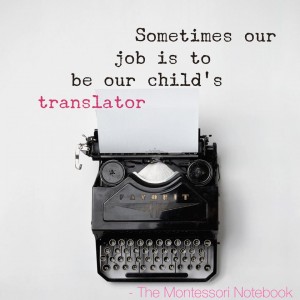Being your child’s translator may be the answer we’ve been looking for
As a Montessori teacher and parent, I am constantly looking for ways to see the world through the child’s eyes. It helps me to understand what is going on for them and to give some guidance when necessary.
What I’ve realised is that I have become a child’s translator. And you can too.

With toddlers when they go to push a child, we can translate, “Is it that you want to play by yourself right now?”. Maybe the translation is “Did you want to ask if you can play too?”. Or “Did you want to say that the toy will be available soon?”
With a child who is hiding behind your leg, again we translate for them, “Is it that you don’t feel like talking right now?”.
With a baby who is crying, “I think she’s saying she likes it when you’re gentle.”
With an older child who is raging, we might translate it into their emotions, their views or their feelings of injustice.
With siblings, you may be able to translate the war that is going on in front of you, “Peter, it looks like you are really mad at Susie for breaking your book and, Susie, you look like Peter really upset you when he came into your room without asking.”
Why it’s handy to be a child’s translator
A few things come to mind that are useful about being a child’s translator:
1. Other people – who may just think your child is being naughty, or impatient, or “shy” – will also be able to better understand things from your child’s perspective.
2. It shows we accept our child and their feelings. All of them. Even the big ugly scary ones.*
3. Your child will feel understood. There is nothing better than a friend who just seeks to understand you – they give support without pity, advice, teaching etc. I hope my kids and the children I work with get that from me too.
4. Rather than you playing judge and jury for siblings, they can take responsibility for working out a solution together.
5. You don’t take the child’s behaviour personally because you are busy translating what they are saying. This supports the child without us getting upset too.
That said, I’m sure there are moments when we wish someone would just invent Google Translate for children ;).
Adult’s need translators too
You can also use it with other adults, for example, when they are upset or hurt, “Is it that you aren’t sure you have time to help me out?”
If you find that you have shouted at your kids or nagged them, you might even find yourself saying, “I’m sorry I shouted. I think what I was trying to say is that I would like some acknowledgement when I cook dinner for the family.”
See what I mean. Being your child’s translator may be the answer we have been looking for. I would love to hear if this resonates with you. Drop me a note or post on the Facebook page how you have been your child’s translator.
* Even though I accept all their feelings, it is totally ok to step in to stop inappropriate expression of these feelings. If your child is hitting or biting another child, this needs to be stopped first. “I can’t let you hurt Jenny.” Then translate…

Simone Davies has more than 20 years’ experience as an AMI Montessori educator. Simone is the author of “The Montessori Toddler” and co-author of “The Montessori Baby” and “The Montessori Child” books, comprehensive guides to raising children in a Montessori way. She currently runs parent-child Montessori classes in Amsterdam at her school Jacaranda Tree Montessori. She also has a popular blog, instagram and podcast “The Montessori Notebook” and is mother to two young adults.